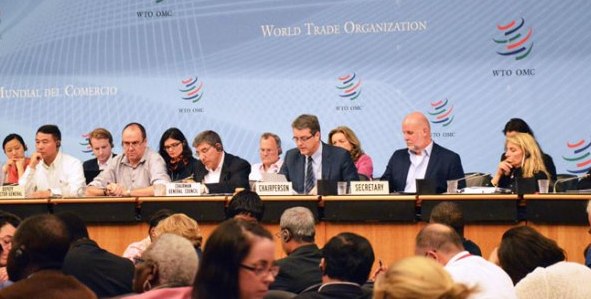The choice was stark before the Indian government: it could ratify the Trade Facilitation Agreement (TFA) at the WTO meeting in Geneva and leave 800 million of its poor people at the mercy of market forces, or it could stand up for them and risk the opprobrium of the US and EU.
Intense pressure was brought to bear on the newly-elected Narendra Modi government to fall in line but New Delhi was very clear that it would not sign on the dotted line unless there was a parallel agreement that guaranteed India’s right to stock and subsidise food at levels far in excess of those permitted under WTO rules, which stipulate that such subsidies should not exceed 10% of the value of food production.
Since the formula uses prices from two decades ago, India’s food subsidy bill and public stockholding of foodgrains will almost certainly exceed the limit and expose the country to stiff penalties.
Indian trade negotiators have reiterated that they are not opposed to the TFA, which is expected to add $1 trillion to the global economy and create 21 million jobs worldwide.
They are only wary that if the TFA is implemented without a binding agreement that guarantees food security for India’s poor, they will lose all leverage over the negotiating process.
“How will we make the US and EU listen to us? And what recourse will we have if they don’t?” asked a senior government official on condition of anonymity.
US and EU, he said, may then use extant WTO rules to force their way into the Indian foodgrains market, with disastrous consequences for the poor. The only way to prevent this and ensure food security for the needy and livelihoods for India’s farmers was to delay the ratification of the TFA.
What does India now want? A peace clause on its food security concerns – which will protect it from being challenged for alleged unfair trade practices – to run till the WTO works out the parallel agreement on the issue.
Since the broad parameters of this agreement had been worked out in Bali last year, Indian negotiators feel a binding pact can be hammered out soon after the WTO comes out of a month-long recess in September.
Both these agreements can then be ratified and implemented by December 31, 2014.That’s not an unreasonable demand.
Please note here: the EU hasn’t shown the least bit of urgency on cutting down its humungous subsidy bill on dairy and farm products. To expect the Indian government to do so is naïve.
Some western diplomats have held out the threat of going ahead with the TFA without India but that would be shortsighted and signal to the other emerging and developing economies that WTO forum discriminates against them.
The argument of TFA’s proponents, that the deadline agreed in Bali for the deal on food security is 2017 and that India should take the non-binding understanding guaranteeing food security for its citizens at face value is disingenuous.
Would the EU have accepted such a demand if 60% of its citizens faced the prospect of their livelihoods getting wiped out? Of course it wouldn’t. So why should the Modi government?
There is a political reason for India’s stand as well. The Indian electorate, the world’s largest (it compares to the electorate of the US and EU combined), has voted in a single party with an absolute majority after a gap of 30 years. Why?
It was tired of corruption, mal-governance and of being sold down the river by a succession of greedy, disconnected leaders. Modi promised change and the hope of a better tomorrow.
The burden of expectations he carries is massive. His government, obviously, cannot bank on the goodwill of the world at large to ensure a minimum level of sustenance for the country’s citizens.
It did what 800 million people had given it a mandate to do – secure their future. Why did the world expect anything else?
The article was first published on India Inc. Manoj Ladwa is the founder and chief executive of India Inc







